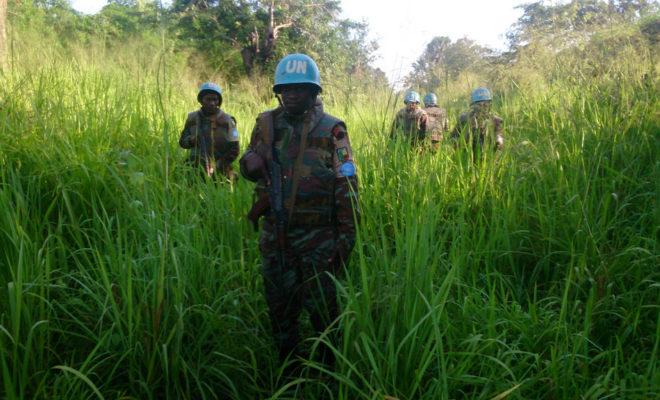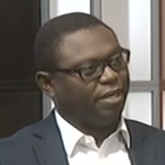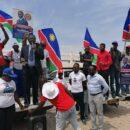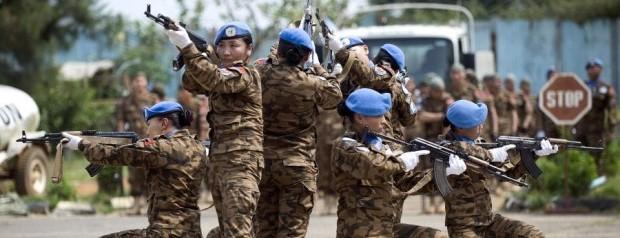The Congo’s political crisis is stirring deadly violence in Kasai and beyond

The UN has labelled the DRC a “level 3 emergency“. This is its highest warning and puts it on par with Syria and Yemen.

UN peacekeepers in Tanganyika, one of the regions that has seen escalating conflict. Credit: MONUSCO.
Over the last couple of years, scores of activists have died protesting against President Joseph Kabila’s refusal to step down. In the latest bout of nationwide demonstrations on 31 December 2017, at least seven more were killed as they took the streets. Many more were arrested.
However, it is not just the Democratic Republic of Congo’s (DRC) towns and cities that have witnessed violence as a result of the country’s deepening political crisis. Kabila’s determination to stay in power despite his term officially ending in December 2016 has also aggravated more localised conflicts, causing widespread death and displacement.
Conflict in Kasai
One such conflict has devastated the Kasai region since mid-2016, leading to the displacement of 1.4 million people internally and 35,000 across the border with Angola.
The conflict first started as a dispute between a local customary leader and central authorities in Kinshasa. But events escalated when the local chief was killed by the Congolese military. His followers formed a militia known as the Kamuina Nsapu and fighting quickly spread throughout a region roughly the size of the UK.
Refugees in Angola told International Refugee Rights Initiative (IRRI), which released a report on the violence today, that members of the militia entered their villages and beheaded state officials. They committed horrific violence, but most witnesses said the fighters did not target ordinary citizens.
In response, the Congolese army employed heavy force against the poorly-armed militia, which was mostly made up of children. After neutralising the group, they reportedly turned on the civilian population.
“They shot at everyone. They destroyed our houses and killed a lot of people,” said one refugee. “It was a slaughterhouse.” Along with others, he described how the army killed civilians, committed sexual violence, and looted and burned down many homes.
Inhabitants of another town caught up in the conflict described how a pro-government militia named Bana Mura (after Kabila’s presidential guard) also attacked Kamuina Nsapu and the local population. Supported by local officials and consisting of ethnic groups largely supportive of the government, the Bana Mura killed civilians en masse.
Provincial authorities did not heed calls for protection, while the UN mission MONUSCO only redeployed to the region after the events. The UN said the actions of the Bana Mura could amount to crimes against humanity.
The conflict has led to a rise in ethnic tensions in the region. But it would be wrong to see the clashes in Kasai isolated from the larger political context. Many refugees said that while their towns were peaceful until recently, the disputed 2011 presidential elections and the politically-manipulated decentralisation process that followed them created tensions between those for and against President Kabila. Moreover, the government’s actions in supporting pro-Kabila fighters, using disproportionate force, and abusing the civilian population have all been crucial in escalating the situation.
Risks across the Congo
With the fragile security situation improving, some refugees are returning to Kasai. But the region – once an impoverished but relatively stable part of the DRC – is still facing a massive humanitarian emergency as a result of the violence.
However, it is not the only part of the country facing such dire challenges. The UN has labelled the country as a whole a “level 3 emergency“. This is its highest warning and puts it on par with the likes of Syria and Yemen.
Similar conflicts to that in Kasai are still ongoing or now emerging elsewhere in the DRC. Armed groups in the volatile Kivu provinces, for example, continue to proliferate and generate insecurity. Local conflicts in Haut-Katanga, Tanganyika, and Ituri have caused significant refugee flows to Zambia and Uganda.
Despite different and complex dynamics, these conflicts all share a combination of local tensions, abuses by security forces, and rent-seeking by political entrepreneurs. They are also reinforced by the wider national crisis.
In each of these, humanitarian agencies are struggling to cope with the increasing needs of internally displaced people and refugees. Meanwhile, MONUSCO struggles to deter violence and protect civilians, and has become a target of deadly attacks itself.
A deepening national crisis
The situation in the DRC is only likely to get worse as the national crisis deepens. While elections have now been scheduled for the end of 2018, few believe they will actually take place. This popular frustration, along with the government’s willingness to engage in brutal repression in response, were both witnessed all too clearly on New Year’s Eve.
In Kasai, impunity for the crimes committed provides a breeding ground for future discontent and a platform for further armed group mobilisation. With rule of law under pressure and institutions more fragile than ever, politico-military spoilers are allowed to dominate.
In the coming months, the DRC will again be on the agenda of the UN Security Council and the UN Human Rights Council. They will have to decide beteween two broad approaches. One would be to further limit the resources of the overstretched MONUSCO, while maintaining a wait-and-see approach to elections and accountability for crimes in the Kasai. The other would be to take tangible action in actively urging the government to de-escalate the political crisis, protect civilians, and support accountability.
Only one has a hope of defusing the national political crisis and, with it, the deadly and disruptive local conflicts it stimulates.
On 16 January 2018, International Refugee Rights Initiative published a report on the violence and displacement in the Kasai.






